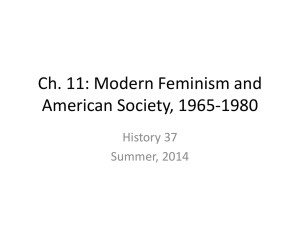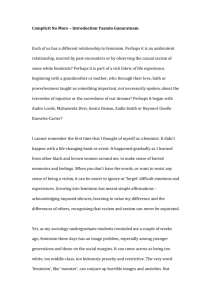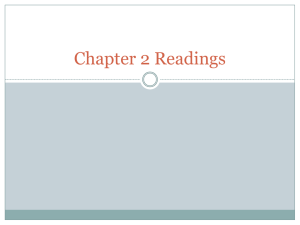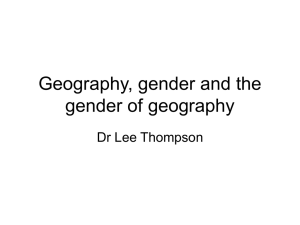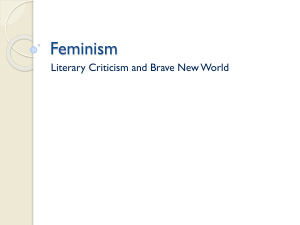Teaching Programme
advertisement
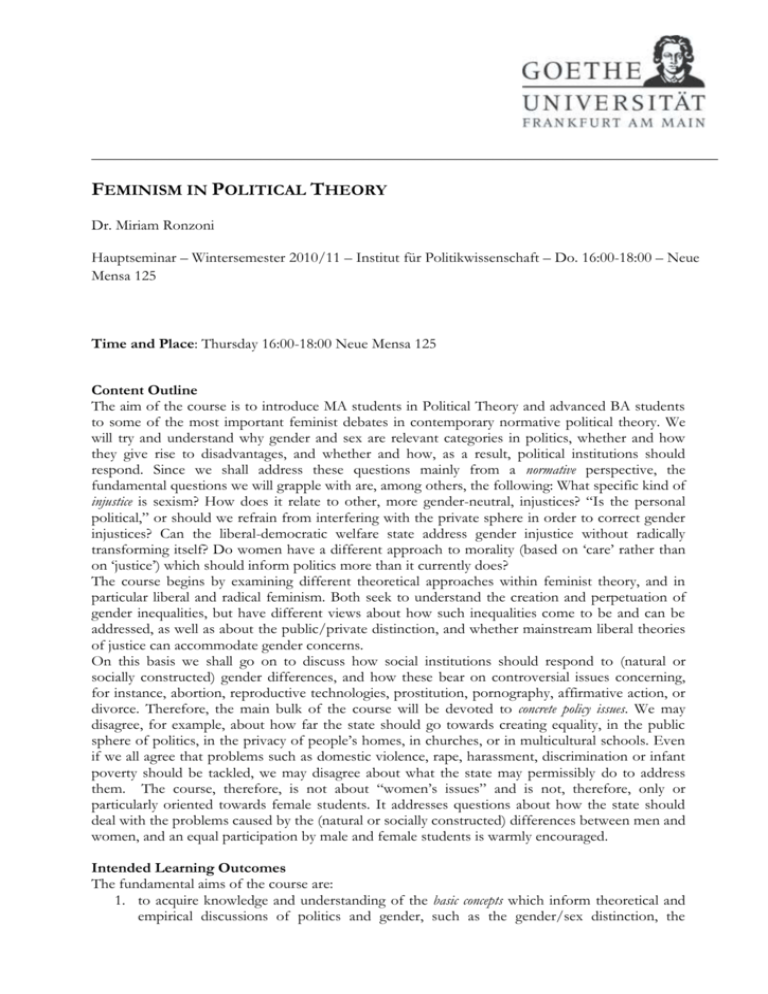
_________________________________________________________________________________ FEMINISM IN POLITICAL THEORY Dr. Miriam Ronzoni Hauptseminar – Wintersemester 2010/11 – Institut für Politikwissenschaft – Do. 16:00-18:00 – Neue Mensa 125 Time and Place: Thursday 16:00-18:00 Neue Mensa 125 Content Outline The aim of the course is to introduce MA students in Political Theory and advanced BA students to some of the most important feminist debates in contemporary normative political theory. We will try and understand why gender and sex are relevant categories in politics, whether and how they give rise to disadvantages, and whether and how, as a result, political institutions should respond. Since we shall address these questions mainly from a normative perspective, the fundamental questions we will grapple with are, among others, the following: What specific kind of injustice is sexism? How does it relate to other, more gender-neutral, injustices? “Is the personal political,” or should we refrain from interfering with the private sphere in order to correct gender injustices? Can the liberal-democratic welfare state address gender injustice without radically transforming itself? Do women have a different approach to morality (based on ‘care’ rather than on ‘justice’) which should inform politics more than it currently does? The course begins by examining different theoretical approaches within feminist theory, and in particular liberal and radical feminism. Both seek to understand the creation and perpetuation of gender inequalities, but have different views about how such inequalities come to be and can be addressed, as well as about the public/private distinction, and whether mainstream liberal theories of justice can accommodate gender concerns. On this basis we shall go on to discuss how social institutions should respond to (natural or socially constructed) gender differences, and how these bear on controversial issues concerning, for instance, abortion, reproductive technologies, prostitution, pornography, affirmative action, or divorce. Therefore, the main bulk of the course will be devoted to concrete policy issues. We may disagree, for example, about how far the state should go towards creating equality, in the public sphere of politics, in the privacy of people’s homes, in churches, or in multicultural schools. Even if we all agree that problems such as domestic violence, rape, harassment, discrimination or infant poverty should be tackled, we may disagree about what the state may permissibly do to address them. The course, therefore, is not about “women’s issues” and is not, therefore, only or particularly oriented towards female students. It addresses questions about how the state should deal with the problems caused by the (natural or socially constructed) differences between men and women, and an equal participation by male and female students is warmly encouraged. Intended Learning Outcomes The fundamental aims of the course are: 1. to acquire knowledge and understanding of the basic concepts which inform theoretical and empirical discussions of politics and gender, such as the gender/sex distinction, the separation between a public and a private sphere, the ideal of social construction of gender, concepts such as “glass ceiling” and “comparable worth”, and others; 2. to acquire knowledge and understanding of the core normative issues within feminism, such as whether gender justice demands interference with the private sphere, whether equality means equal treatment, whether reparative justice is an appropriate category for gender, whether we should address gender through the lenses of justice or of care, and others; 3. to understand the interplay between normative and empirical considerations when it comes to assessing, proposing, and recommending policies; 4. to develop argumentative skills, and in particular to learn how to make sound normative arguments. The course is mainly concerned with feminist debates within what is generally called “analytical political theory”, although we will touch on other theoretical approaches, as well. This means, first and foremost, two things: a) topics are, most of the time, studied from a normative perspective, asking questions such as “what does justice require us to do?” or “is the prohibition of prostitution desirable, and why?”; b) analytical political theory, if it is to be done well, requires combining philosophically rigorous arguments with political and moral understanding and sensitivity. The course aims not only at creating a thorough understanding of what contemporary normative political theory is about, but also at teaching you how to do it yourself. Therefore, both presentations and essays, should hence always take the form of making a substantive argument about the topic at hand, whilst showing knowledge of the current state of the debate. Requirements and Assessment Each students will be expected to give a 15-20 minutes length presentation in a session of the seminar. If you wish, you can also present twice (since each student who wish to obtain a Leistungsnachweis for the course will have to write two essays, it might be in your interest to make two presentations). Remember that your presentation should make an argument, or at least provide a critical assessment of an existing one, rather than providing a summary of the set texts. Requirements for Teilnahmenachweis (with no grade): (a) attendance and active participation in the seminar sessions; (b) 1 Presentation. Requirements for a Leistungsnachweis (HP, HA): (a) attendance and active participation in the seminar sessions; (b) 1 or 2 Presentations; (c) Two written essays, preferably in English, of roughly 5,000 words each (read: between a minimum of 4,000 and a maximum 0f 6,000) each. Word count must appear on the front page of each essay. Each essay should address one of the seminar’s topics, please come to my office hours to coordinate the exact research question and title. Participants are strongly encouraged to submit one of the essays before the end of the semester, and the strict deadline for both essays is no later than April 15th, 2011. You are required to read the set texts each week. The number of items varies almost every weeks but this reflects the accessibility of the assigned texts, so the reading burden is more evenly distributed than it seems . The further reading is meant as a source of inspiration for the topics 2 that interest you particularly, and particularly for the two topics you decide to write your essays about and for your presentation. You are however encouraged, and indeed expected, to undertake independent bibliographical research for your essays, and to come up with your own literature. If the need arises, I am open to schedule an extra wrap-up session for Q&A at the end of the Semester. Your tutorial presentation will count for 10% of your final grade. The remaining 90% will be determined by your examination script or written coursework (in the two essays option, 45% each). Office Hours, Essay Submission, and Access to Course Material Please upload your essays on the WebCT Platform, accessible here (you can sign up with your email account username and password, look for this course, and sign up for it): https://webct.server.uni-frankfurt.de/ (using the Aufgabe Function) by no later than April 15th, 2011 at Midnight. My office hours in the Winter Semester 2010/2011 are on Tuesday afternoon from 4.30 to 6 pm. My office is in the Varrentrappstrasse nr. 40-42, on the ground floor, room 14. You need to ask the staff at the reception to open the corridor door for you. A copy of this Syllabus is available on my website here: http://www.mwpweb.eu/MiriamRonzoni/teaching.htmland and will soon be made available on WebCT (Folder “Syllabus”). A copy of the reader (compulsory reading for each week) is available on WebCT ((Folder “Course Syllabus”) as well as the copy shop Copies etc., Gräfstr. 43, to be printed out as a hard copy. Texts from Alison Jaggar’s book Living with Contradictions will be made available in due course (the book has been ordered but is not yet available). Some of the suggested readings might not be easy to access through the UB or through the Fernleihe, but I decided to suggest them anyway whenever I found them particularly good, for those of you with a special interest in one of the topics. Registration for this course with WebCT is open to all members of the university. By registering for the course, you also automatically sign up for the course mailing list, which I will use every once in a while for course-related information. Teaching Programme Week 0 Introduction. How the Topics are Related, Q&A, etc Week 1 Liberal Feminism Week 2 Radical Feminism Week 3 Feminism and Multiculturalism Week 4 Abortion Week 5 Surrogacy Week 6 Marriage and Divorce Week 7 Feminine Appearance Week 8 Prostitution Week 9 Pornography Week 10 Work Week 11 Women’s “Different Voice” Week 12 Affirmative Action Week 13 The Myth of Motherhood 3 General Readings Saul, J Beauvoir, de, S Frieadn, Betty, Jaggar, A (ed.) Okin, S M Tong, R Kymlicka, W Whelehan, I Bryson, V Bryson, V Lorber, J Feminism. Issues and Arguments The Second Sex The Feminine Mystique Living with Contradictions Gender, Justice and the Family Feminist Thought ‘Feminism’, Contemporary Political Philosophy ( esp. week 3, 8, 10) Modern Feminist Thought Feminist Political Theory Feminist Debates: Issues of Theory and Political Practice Gender Inequality Oct 21st: business meeting – explanation of course requirements and structure, distribution of presentations, Q&A, etc. 1. OCT 28TH - TYPES OF FEMINISM 1: LIBERAL FEMINISM a) Rosemarie Tong, Feminist Thought, chapter 1 b) I. Whelehan, Modern Feminist Thought, chapter 1 c)) Martha Nussbaum, ch. 2 (“The Feminist Critique of Liberalism”), in her Sex and Social Justice Further Reading: Wollstonecraft, M Mill, J S Friedan, Betty, Okin, S. M. Eisenstein, Z Okin, S M A Vindication of the Rights of Women The Subjection of Women The Feminine Mystique Gender, Justice and the Family The Radical Future of Liberal Feminism Women in Western Political Thought, Ch 9 2. NOV 4TH - TYPES OF FEMINISM 2: RADICAL FEMINISM a) Catharine MacKinnon, chapters 1 and 2 (from Part called “approaches”) of Feminism Unmodified b) I. Whelehan, Modern Feminist Thought, chapter 3 c) Valerie Bryson, Feminist Political Theory: An Introduction, chapter 10 Further Reading: Firestone, S MacKinnon, C Dworkin, A Figes, E Jaggar, A The Dialectic of Sex Feminism Unmodified Intercourse Patriarchal Attitudes Chs 1, 2, 6, 7 Feminist Politics and Human Nature, Chs 5, 9 3. NOV 11TH - FEMINISM AND MULTICULTURALISM a)Susan M. Okin “Feminism and Multiculturalism: Some Tensions” Ethics 1998/4 or “Is Multiculturalism Bad for Women” Boston Review (online) –both to be scanned, students can then choose b) Y. Tamir, “Hands off Clitoridectomy”, Boston Review (online) c) Saul, chapter 9 4 Further Reading: Anne Phillips Sen, A Sen, A Sen, A Multiculturalism without Culture The Quality of Life, part III Women’s Survival as a Development Problem’, Bulletin of the American Academy of Arts and Sciences, 43, (1989) ‘Missing Women’, British Medical Journal 304, 1992 4. NOV 18TH- ABORTION a) Judith Jarvis Thompson, “A Defense of Abortion” Philosophy and Public Affairs 1971 b) Jennifer Saul, Feminism. Issues & Arguments chapter 4 Further Readings: Texts on abortion in Jaggar, A, Living with Contradictions Cohen M et al The Rights and Wrongs of Abortion Dworkin, R Life’s Dominion, “The Concept of Unenumerated Rights’, Freedom ‘s Law, Ch 3 MacKinnon, C A Feminist Theory of the Slate, Ch 10 Scanlon, T ‘Partisan for Life’, Review of Dworkin, New York Review of Books, 15 July, 1993 Singer, P ‘Taking Life: Abortion’, Practical Ethics Marquis, D ‘Why Abortion is Immoral’, Journal of Philosophy, 1989 Davis, N ‘The Abortion Debate’, Ethics 103, 1993 Glover, J Causing Death and Saving Lives, Chs 9-1 1 Harris, J The Value of Life, Chs 6-8 Finnis, J ‘The Rights and Wrongs of Abortion’, Philosophy and Public Affairs, 1971 Thompson, J J ‘Rights and Deaths’, Rights, Destitution and Risks, & Philosophy and Public Affairs, 1973 Tooley, M ‘Abortion and Infanticide’, P Singer, Applied Ethics & Philosophy and Public Affairs, 1972 Hare, R ‘Abortion and the Golden Rule’, Philosophy and Public Affairs,1975 Bass, T A ‘The Abortion Revolutionary’, Observer Magazine, 14 Nov 1993 !!!Nov 25th - NO SEMINAR SESSION ON THIS DATE!!! 5. DEC 2ND SURROGACY a) Richard Arneson, ‘Commodification and Commercial Surrogacy’, Philosophy and Public Affairs 1992 b) Debra Satz, ‘Markets in Women’s Reproductive Labor’, Philosophy and Public Affairs 1992 Further Readings: Texts on reproductive technology in Jaggar, A, Living with Contradictions Wertheimer, ‘Two questions about Surrogacy and Exploitation’, Philosophy and Public Affairs, 21.3, 1992 Anderson, E ‘The Ethical Limitations of the Market’, Economics and Philosophy, 1990 or Value in Ethics and Economics, Ch 7 Anderson, E ‘Is Women’s Labor a Commodity’, Philosophy and Public Affairs, 1989 or Value in Ethics and Economics, Ch 8 Andre, ‘Blocked Exchanges’, Ethics, 1992 5 6. DEC 9TH - MARRIAGE AND DIVORCE a) Susan M. Okin, Justice, Gender, and the Family, chapters 2, 6, and 7 Further Readings: Texts in Jaggar, A, Bland, L Weitzman, L J June R. Carbone Living with Contradictions Banishing the Beast, Ch 4 The Marriage Contract, Chs 1-4,7,8 ‘A Feminist Perspective on Divorce’, The Future of Children 4/1, 1994 7. DEC 16TH - FEMININE APPEARANCE a) Saul, chapter on “Feminine Appearance” b) Christa D'Souza, The Observer 2007, “My name is Christa. I'm an age-orexic” available here: http://www.guardian.co.uk/lifeandstyle/2007/may/13/healthandwellbeing.features →Viewing of documentary: Lorella Zanardo, “The Body of Women” Further Reading: Chambers, C Jeffreys, S Jeffreys, S Papadaki, EL Bartlett, KT, Strahan, EJ, et al, Sex, Culture and Justice: The Limits of Choice, Chs 1, 5 Beauty and Misogyny : Harmful Cultural Practices in the West ‘Body modification as self mutilation by proxy’, in Hearn, J, et al., Sex, Violence and the Body: The Erotics of Wounding ‘Feminist Perspectives on Objectification’, Stanford Encyclopedia of Philosophy, http://plato.stanford.edu/entries/feminism-objectification/ ‘Only girls wear barrettes: dress and appearance standards, community norms, and workplace equality’, Michigan Law Review 1994 ‘Don’t take another bite: How sociocultural norms for appearance affect women’s eating behavior’, Body Image 2007 8. JAN 13THTH - PROSTITUTION a) L. Shrage ‘Should Feminists Oppose Prostitution’, Ethics 99/2, 1989 b) Texts on prostitution in Jaggar, Living with Contradictions (book on order, texts will be circulated later) Further Readings: Primoratz, I Ericsson, L ‘What’s Wrong with Prostitution?’, Philosophy 68. 264, 1993 ‘Charges Against Prostitution: An Attempt at a Philosophical Assessment’, Ethics 90, 1979/80 Pateman, C Defending Prostitution: Charge Against Ericsson’, Ethics 93, 1982/3 The Sexual Contract, Ch 7 http://en.wikipedia.org/wiki/Prostitution 9. JAN 20 TH - PORNOGRAPHY a) Saul, chapter 3 b) Texts on Pornography in Alison Jaggar, Living with Contradictions ((book on order, texts will be circulated later) Further Readings: MacKinnon, C. Dworkin, A Only Words Pornography, Men Possessing Women 6 Dworkin, R Langton, R Langon, R West, C ‘Is There a Right to Pornography’, Oxford Journal of Legal Studies, 1981 ‘Pornography, Speech Acts and Silence’ in LaFollette, H, Ethics in Practice 1997 ‘Speech Acts and Unspeakable Acts’, Philosophy and Public Affairs 1993 ‘Pornography and Censorship’, Stanford Encyclopedia of Philosophy, http://plato.stanford.edu/entries/pornography-censorship/ 10. JAN 27TH - WORK a) Jennifer Saul, chapter 1 b) Valerie Bryson, ‘The Family and Paid Employment’, from Feminist Debates: Issues of Theory and Political Practice (Hampshire and New York: Palgrave, 1999), Ch. 6. c) B. Friedan, The Feminine Mystique, chapter 1 d) Linda Hirshman, Homeward Bound, The American Prospect, to be found here: http://www.prospect.org/cs/articles?articleId=10659 and this reply: http://www.theatlantic.com/doc/200807/working-moms Further Readings: A Collection of articles, extremely useful to collect figures and factual information: http://feminism.eserver.org/workplace Friedan, B The Feminist Mistyque, rest of the book Nino, L, ‘Women: Feminism, Sexuality, and Equality in the Work Place’, http://www.g-casa.com/download/Nino_Women_s_sexuality.pdf Linda Hirshman, Get to Work, 2006 Schultz, V ‘Feminism and Workplace Flexibility’, Connecticut Law Review 2010 11. FEB3 RD - WOMEN’S “DIFFERENT VOICE” a) Jennifer Saul, chapter 7 b) Carol Gilligan, In a Different Voice, chapter 3 Further Readings: Excellent, if somewhat outdated, bibliography here: http://womenst.library.wisc.edu/bibliogs/ethicbib.html Gilligan, C In a Different Voice, rest of the book Tronto, J Moral Boundaries Held, V The Ethics of Care Engster, D “Care Ethics and Natural Law Theory”, Journal of Politics 2004 12. FEB 10RD - AFFIRMATIVE ACTION a) Anne Phillips, The Politics of Presence, chapter 3 b) texts in Jaggar on work, affirmative action, and comparable worth Further Readings: Cohen M, et al, Newton, L H S A Ketchum Wasserstrom, R Goldman, A H Blackstone, W T et al, Equality and Preferential Treatment, ‘Reverse Discrimination as Unjustified’, Ethics 83, ‘Evidence, Statistics and Rights: A Reply to Simon’, Analysis 1979 also as ‘An Exchange on Preferential Treatment’ J Narveson, Moral Matters ‘A Defense of Programs of Preferential Treatment’, National Forum 58.1, 1978 Justice and Reverse Discrimination Social Justice and Preferential Treatment 7 Gross, B (ed) Day, J P ‘ Reverse Discrimination Compensatory Discrimination’, Philosophy 56 13. FEB 17TH - THE MYTH OF MOTHERHOOD- GUEST SPEAKER SESSION, PETER BALINT, UNIVERSITY OF NEW SOUTH WALES a) Peter Balint, “Should the promotion of breastfeeding be government policy?”, Australasian b) SPIEGEL Interview with Elisabeth Badinter http://www.spiegel.de/international/zeitgeist/0,1518,713890,00.html c) Di Winstanley, “Existential Stories on The Myth and Reality of Motherhood”; Further Reading: Wolf, J B, ‘Is Breast Really Best? Risk and Total Motherhood in the National Breastfeeding Awareness Campaign.’ Journal of Health Politics, Policy and Law 2007 Badinter, E, Le conflit, la femme et la mère Hays, S. The Cultural Contradictions of Motherhood Warner, J. Perfect Madness: Motherhood in the age of anxiety Douglas, S. and Michaels, M. The Mommy Myth: The idealisation of motherhood and how it has undermined all women Wall, G. ‘Moral constructions of motherhood in breastfeeding discourse’. Gender & Society 2001 Lowe PK, et al., ‘Advocating alcohol abstinence to pregnant women: Some observations about British policy’ Health, Risk & Society, 2010. 8


